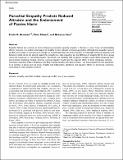Parochial Empathy Predicts Reduced Altruism and the Endorsement of Passive Harm
Author(s)
Bruneau, Emile Gabriel; Cikara, Mina; Saxe, Rebecca R.
DownloadPublished version (249.6Kb)
Terms of use
Metadata
Show full item recordAbstract
Empathic failures are common in hostile intergroup contexts; repairing empathy is therefore a major focus of peacebuilding efforts. However, it is unclear which aspect of empathy is most relevant to intergroup conflict. Although trait empathic concern predicts prosociality in interpersonal settings, we hypothesized that the best predictor of meaningful intergroup attitudes and behaviors might not be the general capacity for empathy (i.e., trait empathy), but the difference in empathy felt for the in-group versus the out-group, or “parochial empathy.” Specifically, we predicted that out-group empathy would inhibit intergroup harm and promote intergroup helping, whereas in-group empathy would have the opposite effect. In three intergroup contexts—Americans regarding Arabs, Hungarians regarding refugees, Greeks regarding Germans—we found support for this hypothesis. In all samples, in-group and out-group empathy had independent, significant, and opposite effects on intergroup outcomes, controlling for trait empathic concern. ©2017, © The Author(s) 2017.
Date issued
2017-06Department
Massachusetts Institute of Technology. Department of Brain and Cognitive SciencesJournal
Social Psychological and Personality Science
Publisher
SAGE Publications
Citation
Bruneau, Emile G. et al., "Parochial Empathy Predicts Reduced Altruism and the Endorsement of Passive Harm." Social Psychological and Personality Science 8, 8 (November 2017): 934-42 doi. 10.1177/1948550617693064 ©2017 Authors
Version: Final published version
ISSN
1948-5514